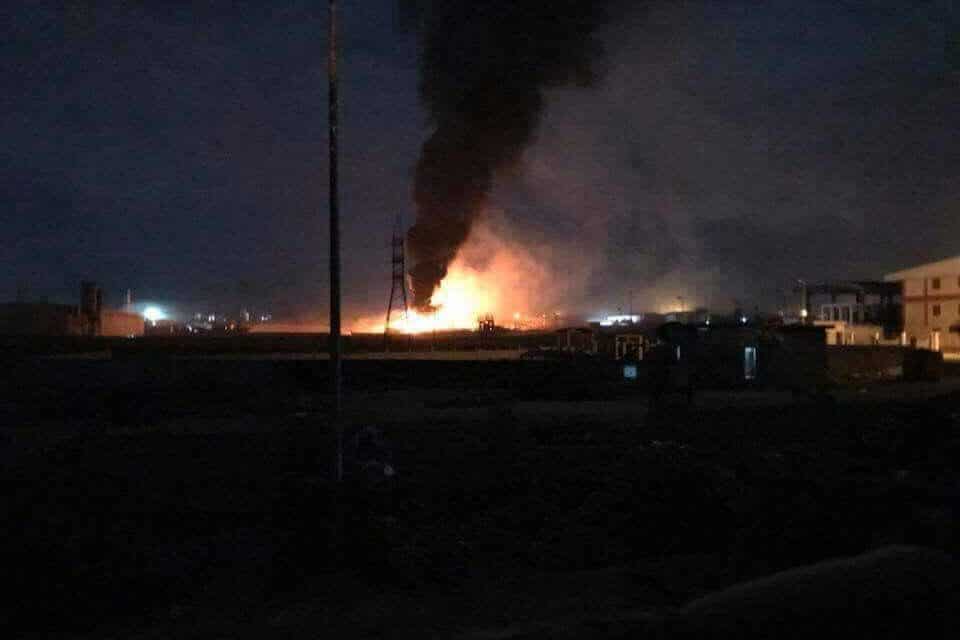Latest Israeli attacks follow Cabinet discussions on Iranian presence in Syria
LATEST
Israel has again attacked regime positions near Damascus and in southwest Syria.
Syrian State TV said Israeli jets, operating inside Lebanese airspace, fired missiles at a military base in the al-Qutaifa area near Damascus, early Tuesday morning. Israel then fired ground-to-ground rockets from the Israeli-occupied Golan Heights.
The reports claimed Syrian air defenses hit one of the warplanes, destroyed the missiles, and downed one of the rockets, although others caused material damage.
In line with its policy, the Israel Defense Forces did not confirm or deny the operations.
During Syria’s 81-month conflict, Israel has repeatedly struck targets of the regime and its foreign allies, often to prevent transfer of weaponry to Lebanon’s Hezbollah and to deter any Hezbollah or Iranian positions near the Golan Heights.
The al-Qutaifa base hosts the Assad regime’s 155th Artillery Regiment and its Scud missile launchers. Israeli analysts says that, since 2010, the complex has served as “Hezbollah’s advanced Scud missile base”.
Senior Israeli ministers and defense officials have reportedly been holding high-level talks about Iran’s military approach in Syria and its alliance with Hezbollah.
“The Middle East is raging around us, and what concerns us the most are Iranian efforts to establish military bases in Syria,” Energy Minister Yuval Steinitz said on Monday. “The prime minister is leading a multifaceted campaign to stop this entrenchment.”
Last month, Israel fired missiles at a base near Damascus which Iran has reportedly been developing, with claims that Iranian military personnel were killed and buildings destroyed.
The regime’s military proclaimed that Israel’s “desperate attempts” to “raise [rebels’] morale after the painful blows they received in Harasta in Eastern Ghouta in Damascus countryside and the sweeping victories the Syrian Arab Army is achieving in Idlib”.
Defying de-escalation zones, the regime and its allies are trying to overrun East Ghouta near Damascus and to establish positions inside Idlib Province in northwest Syria, almost all of which is held by the opposition.
See Syria Daily,Jan 8: Bombing and a Deadly Explosion in Idlib Province
Latest Pro-Assad Attacks on East Ghouta Near Damascus
Journalist Hadi al-Abdallah posts pictures of the latest pro-Assad attacks on the besieged opposition-held East Ghouta area near Damascus:
صور: الطائرات الحربية تستهدف الأحياء السكنية في مدن وبلدات الغوطة الشرقية بغارات جوية مكثفة منذ الصباح!
شهداء وجرحى وعالقون تحت الأنقاض
ودمار كبير في المنازل السكنية. pic.twitter.com/LVUotQscW8— هادي العبدالله Hadi (@HadiAlabdallah) January 9, 2018
Pro-Assad bombing and shelling have killed and wounded hundreds of people in recent weeks as regime forces and their allies have tried — so far, unsuccessfully — to overrun East Ghouta despite a de-escalation agreement between Russia and rebels.
Turkey Condemns Pro-Assad Attacks in Idlib
The Turkish Government, possibly drawing a line against a pro-Assad advance, has condemned attacks on opposition territory in Idlib Province in northwest Province.
Foreign Minister Mevlüt Çavuşoğlu said the pro-Assad forces are attacking moderate rebels and civilians areas on the pretext of a campaign against the hardline Islamist group Jabhat al-Nusra, formerly linked to Al Qa’eda.
“This attitude will harm the process for political solution,” Çavuşoğlu told reporters. He said the Assad regime should refrain from attacking opposition elements “who it will meet in the Sochi meeting”, prospective political talks in southern Russia.
Russia, Turkey, and Iran proclaimed a de-escalation zone over Idlib this autumn, but pro-Assad attacks have continued and taken a series of villages in the southeast of the province in recent weeks.
Turkish forces intervened in August 2016 alongside rebels, taking northern Aleppo Province from the Islamic State. Last autumn, Ankara showed a military interest in Idlib with the entry of personnel, in large part to present a frontline with Kurdish forces whom Turkey considers as part of the Turkish Kurdish insurgency PKK.
UN Humanitarian Head Visits Damascus
The head of the UN office for humanitarian affairs is in Damascus today, discussing access and delivery of aid to besieged and conflict-affected areas.
Mark Lowcock, the Under-Secretary-General for Humanitarian Affairs, will also visit Homs during his three-day visit, the first by a UN humanitarian chief since December 2015.
“In Damascus, Mr. Lowcock is expected to meet Government officials, humanitarian agencies and partners, and other key stakeholders,” the UN said in a statement. “In Homs, he will meet with people who have suffered first hand from the effects of the crisis, and need life-saving assistance.”
The Assad regime has blocked almost all assistance to besieged opposition-held areas, including East Ghouta near Damascus, as it pursues a “surrender or starve” strategy.
On Monday, UN agencies delivering aid for the first time in six months to about 50,000 Syrian refugees stranded in a desolate, opposition-held area near the Jordanian border.
Jordanian officials said the crane drop is a one-off to the Rukban camps. Food and water has been limited after Jordan closed the border in June 2016, citing Islamic State attacks that killed seven guards.

